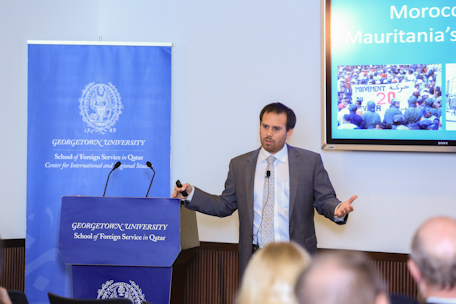Dialogue Series, Regional Studies
Why did the Arab Spring miss the Maghreb?

Matt Buehler, the 2013-2014 Postdoctoral Fellow at CIRS, delivered aMonthly Dialogue lecture on“Why did the Arab Spring miss the Maghreb? Continuity through Co-optation in Morocco and Mauritania,” on February 17, 2014. The talk summarized the results of in-depth fieldwork undertaken in Morocco and Mauritania, where Buehler conducted over 100 interviews with politicians and policymakers. The central question guiding Buehler’s research was, “Under what conditions did an Arab regime survive the Arab Spring?” Some popular theories currently on offer by scholars propose that monarchical states that have a wealth of natural resources, a long history of military loyalty, and a strategy of appeasing indigenous ethnic groups are more resilient and better equipped to overcome civil unrest than nations that do not enjoy similar privileges. In order to put these theories to the test, Buehler argued that it was first necessary to outline the key infrastructural and political differences exhibited by his case study countries of Morocco and Mauritania.
Giving some background to Morocco and Mauritania’s political structures, Buehler challenged the prevalent thesis of the “monarchical exception,” which states “that monarchies seemed to persist longer than non-monarchies.” He explained that, for these two countries, the regime’s mode of governance mattered little for authoritarian persistence, as both states were able to weather the storm of protests that shook their governments in 2011 and 2012, despite the fact that Morocco is a monarchy and Mauritania is not.”
Another theory Buehler examined suggests that countries with a wealth of natural resources, such as the Arab countries of the Gulf, will necessarily overcome civic discord by dint of their ability to placate any opposition by offering a series of concessions. However, although Morocco has substantial natural resources, Mauritania is poor in terms of natural endowments. Yet, they both were able to stave off any serious opposition. This theory too, Buehler argued, was unsustainable.
Observers argue that military loyalty is another crucial characteristic of regime survival, and that the perseverance of Arab regimes depended on the degree of support given by the powerful underlying military state apparatus. The collapse of governments in Egypt and Tunisia are given as key examples. Yet, Buehler argued, whereas Morocco has a history of military loyalty, “in Mauritania, by contrast, there is a very long history of military coups—every single Mauritanian president has been ousted by a coup.”
Further theories logically state that successful integration and assimilation of diverse ethnic minorities is necessarily a means of avoiding internal friction. “In some Arab countries, maybe in Bahrain, maybe in Syria, you might think marginalized ethnic minorities seized the opportunity of the Arab Spring to assert their demands,” Buehler said. However, he pointed out that Morocco has done much to integrate its once marginalized ethnic groups, but Mauritania made no such progress. Thus, once again, “we can’t say that ethnic integration was a very important factor in driving this process,” he said.
After having outlined the key dissimilarities between the two states, the key question remains “what is the commonality in Moroccan and Mauritanian strategies of survival?” He answered this by saying that “these two regimes employed a very crafty, robust strategy of co-optation, which they used to build certain political parties—pro-regime political parties.” In order to study the much abused and complex phenomenon of “co-optation” more closely, Buehler conducted a series of statistical tests throughout Morocco and Mauritania to gauge the extent of regime infiltration into rural politics. Buehler’s research findings conclude that Morocco and Mauritania’s strength “was their ability to monopolize the rural structures of power in order to buttress their rule during the Arab Spring.”
In sum, Buehler warned against the simplistic categorization of Arab states, and argued that there was no definitive answer as to why some regimes fell, whilst others overcame popular unrest in the long run. As his research in Morocco and Mauritania attests, both governments exhibited resilience in the face of the uprisings, despite their fundamental differences in terms of political structure, resource wealth, military loyalty, and ethnic integration.
Dr. Matt Buehler holds a PhD degree in government from the University of Texas at Austin and he will begin a tenure-track position at the University of Tennessee’s Department of Political Science in fall 2014. Dr. Buehler has done extensive fieldwork in Tunisia, Morocco, and Mauritania, and is currently working on a book tentatively entitled The Social Base of Divide-and-Rule: Left-Islamist Opposition Alliances in North Africa’s Arab Spring.
Article by Suzi Mirgani, Manager and Editor for CIRS Publications